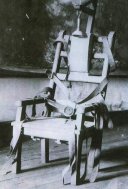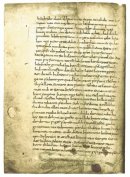I am a woman poor and blind
and little knowledge remains in me,
Long have I sought, but fain (1) would I find,
what herb in my garden were best to be.
A garden I have which is unknown,
which God of his goodness gave to me,
I mean my body, wherein I should have sown
the seed of Christ's true verity.
My spirit within me is vexed sore,
my flesh striveth against the same:
My sorrows do increase more and more,
my conscience suffereth most bitter pain:
I, with myself being thus at strife,
would fain have been at rest,
Musing and studying in mortal life,
what things I might do to please God best.
With whole intent and one accord,
unto a Gardener (2) that I did know,
I desired him for the love of the Lord,
true seeds in my garden for to sow.
Then this proud Gardener seeing me so blind,
he thought on me to work his will,
And flattered me with words so kind,
to have me continue in my blindness still.
He fed me then with lies and mocks,
for venial (3) sins he bid me go
To give my money to stones and stocks, (4)
which was stark lies and nothing so.
With stinking meat then was I fed,
for to keep me from my salvation,
I had trentals (5) of mass, and bulls (6) of lead,
not one word spoken of Christ's passion.
In me was sown all kind of feigned seeds,
with Popish ceremonies many a one,
Masses of requiem (7) with other juggling (8) deeds,
till God's spirit out of my garden was gone.
Then was I commanded most strictly,
If of my salvation I would be sure,
To build some chapel or chantry, (9)
to be prayed for while the world doth endure.
"Beware of a new learning," quoth he, "it lies,
which is the thing I most abhor,
Meddle not with it in any manner of wise,
but do as your fathers have done before."
My trust I did put in the Devil's works,
thinking sufficient my soul to save,
Being worse then either Jews or Turks,
thus Christ of his merits I did deprave.
I might liken my self with a woeful heart,
unto the dumb man in Luke the Eleven, (10)
From whence Christ caused the Devil to depart,
but shortly after he took the other seven.
My time thus, good Lord, so wickedly spent,
alas, I shall die the sooner therefore.
Oh Lord, I find it written in thy Testament,
that thou hast mercy enough in store
For such sinners, as the scripture sayeth,
that would gladly repent and follow thy word,
Which I'll not deny whilst I have breath,
for prison, fire, fagot, (11) or fierce sword.
Strengthen me good Lord in thy truth to stand,
for the bloody butchers have me at their will,
With their slaughter knives ready drawn in their hand
my simple carcass to devour and kill.
O Lord forgive me mine offense,
for I have offended thee very sore,
Take therefore my sinful body from hence,
Then shall I, vile creature, offend thee no more.
I would with all creatures and faithful friends
for to keep them from this Gardener's hands,
For he will bring them soon unto their ends,
with cruel torments of fierce firebrands.
I dare not presume for him to pray,
because the truth of him it was well known,
But since that time he hath gone astray,
and much pestilent seed abroad he hath sown.
Because that now I have no space,
the cause of my death truly to show,
I trust hereafter that by God's holy grace,
that all faithful men shall plainly know.
To thee O Lord I bequeath my spirit,
that art the work-master of the same,
It is thine, Lord, therefore take it of right,
my carcass on earth I leave, from whence it came.
Although to ashes it be now burned,
I know thou canst raise it again,
In the same likeness as thou it formed,
in heaven with thee evermore to remain.
and little knowledge remains in me,
Long have I sought, but fain (1) would I find,
what herb in my garden were best to be.
A garden I have which is unknown,
which God of his goodness gave to me,
I mean my body, wherein I should have sown
the seed of Christ's true verity.
My spirit within me is vexed sore,
my flesh striveth against the same:
My sorrows do increase more and more,
my conscience suffereth most bitter pain:
I, with myself being thus at strife,
would fain have been at rest,
Musing and studying in mortal life,
what things I might do to please God best.
With whole intent and one accord,
unto a Gardener (2) that I did know,
I desired him for the love of the Lord,
true seeds in my garden for to sow.
Then this proud Gardener seeing me so blind,
he thought on me to work his will,
And flattered me with words so kind,
to have me continue in my blindness still.
He fed me then with lies and mocks,
for venial (3) sins he bid me go
To give my money to stones and stocks, (4)
which was stark lies and nothing so.
With stinking meat then was I fed,
for to keep me from my salvation,
I had trentals (5) of mass, and bulls (6) of lead,
not one word spoken of Christ's passion.
In me was sown all kind of feigned seeds,
with Popish ceremonies many a one,
Masses of requiem (7) with other juggling (8) deeds,
till God's spirit out of my garden was gone.
Then was I commanded most strictly,
If of my salvation I would be sure,
To build some chapel or chantry, (9)
to be prayed for while the world doth endure.
"Beware of a new learning," quoth he, "it lies,
which is the thing I most abhor,
Meddle not with it in any manner of wise,
but do as your fathers have done before."
My trust I did put in the Devil's works,
thinking sufficient my soul to save,
Being worse then either Jews or Turks,
thus Christ of his merits I did deprave.
I might liken my self with a woeful heart,
unto the dumb man in Luke the Eleven, (10)
From whence Christ caused the Devil to depart,
but shortly after he took the other seven.
My time thus, good Lord, so wickedly spent,
alas, I shall die the sooner therefore.
Oh Lord, I find it written in thy Testament,
that thou hast mercy enough in store
For such sinners, as the scripture sayeth,
that would gladly repent and follow thy word,
Which I'll not deny whilst I have breath,
for prison, fire, fagot, (11) or fierce sword.
Strengthen me good Lord in thy truth to stand,
for the bloody butchers have me at their will,
With their slaughter knives ready drawn in their hand
my simple carcass to devour and kill.
O Lord forgive me mine offense,
for I have offended thee very sore,
Take therefore my sinful body from hence,
Then shall I, vile creature, offend thee no more.
I would with all creatures and faithful friends
for to keep them from this Gardener's hands,
For he will bring them soon unto their ends,
with cruel torments of fierce firebrands.
I dare not presume for him to pray,
because the truth of him it was well known,
But since that time he hath gone astray,
and much pestilent seed abroad he hath sown.
Because that now I have no space,
the cause of my death truly to show,
I trust hereafter that by God's holy grace,
that all faithful men shall plainly know.
To thee O Lord I bequeath my spirit,
that art the work-master of the same,
It is thine, Lord, therefore take it of right,
my carcass on earth I leave, from whence it came.
Although to ashes it be now burned,
I know thou canst raise it again,
In the same likeness as thou it formed,
in heaven with thee evermore to remain.
(1) Fain: gladly.
(2) Gardener: alludes to Stephen Gardiner, Bishop of Winchester.
(3) Venial: minor (as opposed to mortal) sin.
(4) Stones and stocks: images of saints, made of stone and wood.
(5) Trentals: series of thirty requiem masses.
(6) Bulls: papal edicts.
(7) Requiem: mass for the souls of the dead.
(8) Juggling: misleading, cheating.
(9) Chantry: chapel endowed to say prayers for its founder.
(10) Luke 11.14–26
(11) Fagot: bundle of sticks used in execution by fire.
(2) Gardener: alludes to Stephen Gardiner, Bishop of Winchester.
(3) Venial: minor (as opposed to mortal) sin.
(4) Stones and stocks: images of saints, made of stone and wood.
(5) Trentals: series of thirty requiem masses.
(6) Bulls: papal edicts.
(7) Requiem: mass for the souls of the dead.
(8) Juggling: misleading, cheating.
(9) Chantry: chapel endowed to say prayers for its founder.
(10) Luke 11.14–26
(11) Fagot: bundle of sticks used in execution by fire.
Contributed by Bernart Bartleby - 2016/3/7 - 10:11
×
![]()
Note for non-Italian users: Sorry, though the interface of this website is translated into English, most commentaries and biographies are in Italian and/or in other languages like French, German, Spanish, Russian etc.












Testo trovato su The Norton Anthology of English Literature
Ho preferito attribuire questa ballata ad autore anonimo, siccome appare in broadsides seicentesche, a quasi un secolo di distanza dall’esecuzione sul rogo di Anne Askew (1521-1546). Ma i versi sono riportati come se fosse stata l’autrice di Like as the Armed Knight a comporli di suo pugno. Non viene infatti da tutti esclusa la sua maternità diretta e che il mondo protestante li abbia poi tramandati per molti decenni successivi. In ogni caso, questo dimostra la grande impressione che fece la persecuzione ed il martirio di questa venticinquenne nobildonna inglese che nel 1546 venne torturata e poi arsa viva per aver difeso strenumente la libertà di fede e di coscienza, cadendo vittima delle lotte di potere che si consumavano nelle ultime fasi del lungo regno di Enrico VIII, che prima fu Defensor Fidei contro il diffondersi del luteranesimo e poi divenne invece artefice dello scisma anglicano, guadagnandosi un paio di scomuniche.
Nella ballata “I Am a Woman Poor and Blind”, Anne Askew si rammarica di non aver coltivato prima la vera fede, di essere stata a lungo ingannata dalle lusinghe e dalle menzogne del cattolicesimo. Ma, una volta riacquistata la vista alla luce del credo protestante, la giovane donna si lancia fieramente, incurante della sua stessa vita, contro il “Gardener” che ha cercato di manipolarla con le menzogne propalate dalla Chiesa cattolica, con tutti i suoi orribili fasti e le sue vuote cerimonie e tutti gli altri “juggling” (fregnacce, si direbbe noiartri…). E “Gardener”, in opposizione al “garden” della fede dell’autrice, prima devastato e poi recuperato, corrisponde ad un personaggio storico ben preciso, Stephen Gardiner (1483-1555), vescovo della diocesi di Winchester, Canterbury, rettore della Trinity Hall a Cambridge, King's Secretary sotto Enrico VIII e Lord Chancellor sotto un paio di suoi successori, un potentissimo ed arrogante alto prelato coinvolto in parecchi intrighi di corte e rese di conti in seno alla gerarchia cattolica inglese e nemico giurato dei sacramentisti (coloro che negavano la transustanziazione) e dei protestanti, molti dei quali – come la stessa Anne Askew - mandò alla prigione, alla tortura e alla morte.
Che i macellai sanguinari mi hanno in loro potere
Con i coltelli per scannarmi già saldi nelle loro mani
Pronti ad uccidere e divorare il mio povero cadavere
[...] Vorrei poter strappare dalle grinfie di Gardiner
Tutte le povere creature e gli amici nella fede
Che egli presto sicuramente ghermirà
Straziandoli con crudeli torture e tizzoni ardenti”